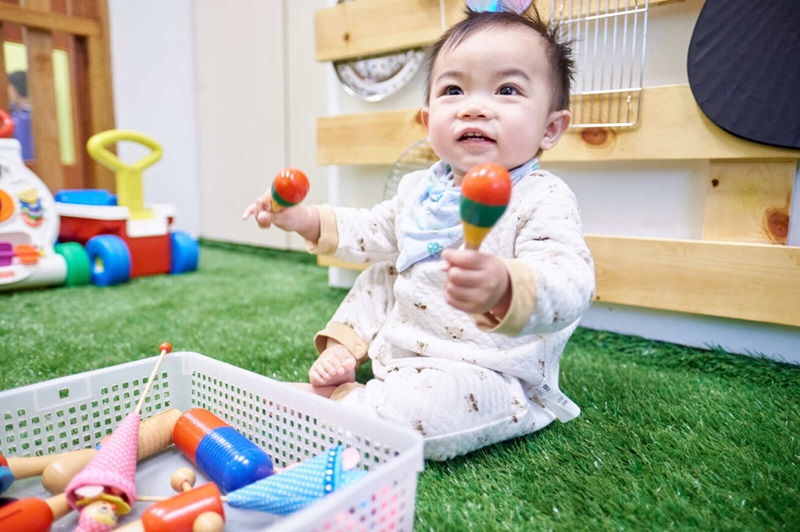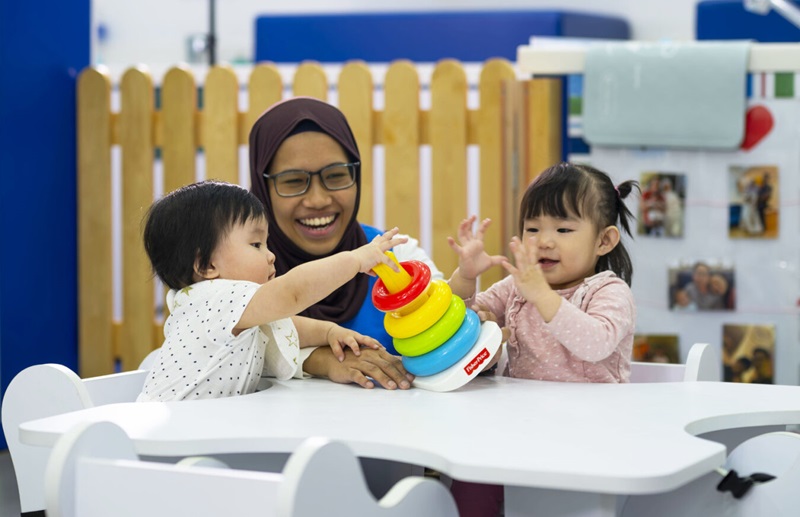
With so many infant care centres in Singapore to choose from, have you shortlisted the ones you would like to visit?
We know there are many consideration factors before deciding to enrol in your ideal infant care centre. One of the most practical ways to “shop” for the right one, is to check out the premises to have a better idea on your child’s potential caregiver’s environment to align expectations.
Unsure what to ask during the centre visit? Here are some key questions to guide you.
Touring Infant Care Centres in Singapore? Top Questions Parents Can Ask!
1. Is the centre accredited by the relevant authorities?
In Singapore, the Early Childhood Development Agency (ECDA) mandates that all Early Childhood Development Centres (ECDCs) must obtain a licence under the Early Childhood Development Centres Act and Regulations. Therefore, it is an offence to operate without this licence.
2. What is the staff-to-child ratio dedicated to infant care?
ECDA stipulates a 1:5 educarer to child ratio for infants (2 to 17 months). Some infant care centres in Singapore may follow a lower ratio, allowing each child to have better attention. During the school tour, parents can ask what’s the current enrolment number and the maximum capacity for the infant care intake too. This also depends on the space dedicated to infant care within the premises.
3. What are the infant care educarers’ qualifications?
How do educarers qualify to be an infant care teacher? There are different certifications that are required for those who wish to teach different age groups from 18 months to 6 years old. For infant care educarers (caring for 2 to 17 months), they need to possess at least a WSQ Higher Certificate in Infant Care (HCIC) or WSQ Higher Certificate in Infant Care - Chinese (HCIC-CL). However, there are educarers who possess Early Childhood qualifications, and that allows them to care across different age groups within a preschool.
That said, you can also ask about the educarers’ related experiences and how often they undergo training to expand and deepen their knowledge. Some teachers may also be CPR and/or first aid-certified – especially helpful when faced with an emergency situation that requires immediate attention.

4. What is the daily schedule for infants?
Young children thrive on the familiarity of a routine, likewise for infants. Ask the school tour representative to share with you how a typical schedule for the infant care children looks like. You may take reference with your schedule for your baby too and consider if you need to make some adjustments at home so that it’s easier for the baby to adapt when enrolling into the centre.
5. How do educarers approach or handle common challenges faced when caring for infants?
Babies are learning to make sense of their world, and with any new environment, routine or caregiver, they may take time to adapt and accept. Some common challenges parents may encounter includes a change in their sleeping schedule, refusal to drink milk and separation anxiety from parents during drop-off.
During the school tour, ask educarers how they would manage such scenarios. You may also pick up some tips on what you can do at home to alleviate the situation.
6. How does the centre handle an outbreak among babies e.g. HFMD?
One of the top concerns parents have when enrolling their children into infant care or childcare, is the exposure to viruses and germs. Some childhood illnesses such as Hand Foot and Mouth Disease (HFMD) and the cold are common during the early childhood years.
Find out about their healthcare protocol and how they handle kids who are sick. What are the gatekeeping steps to identify symptoms and to contain the situation to prevent an outbreak? Should an outbreak occur, what do they do? It’s important to have open communication between parents and school so that all parties can react and make plans in the best interest of children.
7. What are the safety measures in place for day-to-day and unexpected situations?
A safe environment for young children is mandatory - infant care centres in Singapore are expected to conform to construction and design with safety features as a priority. Educarers are also trained and equipped with safety knowledge for daily childcaring. During centre visits, you can ask about their maintenance of learning materials and furniture, and how regular does centre sanitisation take place? If you have an active toddling tot, ask how the educarers can support him/her while ensuring safety and support.
If you’re concerned about unexpected situations such as accidents, inquire about their handling processes too.

8. What type of learning and development programmes does the infant care centre offer?
Although they may not be able to speak yet, infants are already observing and learning. A trusted and reputable infant caregiver does not just “babysit” but also exposes them to a myriad of learning opportunities suited for 2 to 17 months old. Yes, children sharpen skills during their infant care journey too!
Check with the centre what type of activities are extended, how frequent are they done and how those activities nurture a specific developmental milestone. What type of learning pedagogy is the curriculum based on?
9. When my child moves to playgroup level, how different would the programme be?
If you’re concerned about your toddler’s transition from infant care to playgroup, do ask how the educarers will help them adjust and “promote” to the next level. Playgroup starts from 18 months old to 6 years old and is often referred to as ‘childcare’. You will also observe that the curriculum includes a more integrated aspect of a child’s developmental needs, such as literacy, language, as well as numeracy. The scaffolding method of teaching helps prepare children for primary school in time to come.
Discover a Holistic Infant Care Programme at Little Footprints Preschool
At Little Footprints Preschool, our infant care programme is designed to nurture your infant’s holistic development through everyday interactions, play and exploration in a safe, conducive and respectful environment.
We offer full-day and half-day infant care programmes to meet the needs of families. There are also various subsidies for full-day infant care and full-day childcare programmes to enjoy savings.
Book a school tour to visit your nearest Little Footprints Preschool infant care centre.
Follow us on social media to stay updated on our latest updates and happenings:




